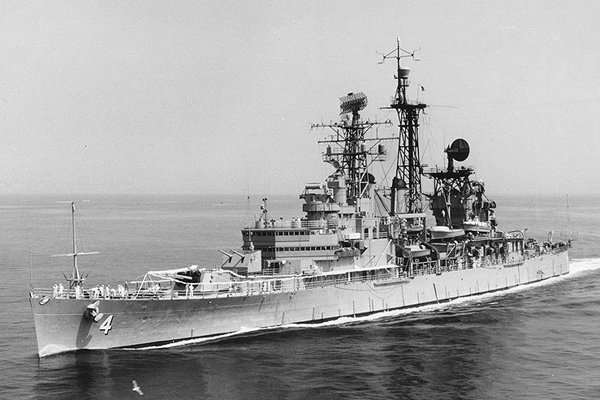The sea-going scribe

Before November 1971, Stephen Burgard’s journalism career consisted of a stint with his high school newspaper and a college radio show. But it was in that month, aboard the U.S.S. Little Rock, through a closed-circuit TV news program, that Burgard — now director of Northeastern University’s School of Journalism — would find his calling.
Burgard, at 22, had joined the crew as an enlisted man only a few months earlier, and to boost morale, the ship’s chaplain had directed that the guided missile cruiser be outfitted with the TV system. The chaplain then tapped Burgard to produce a 10-minute nightly news segment, while at sea up and down the Atlantic Ocean and in the Mediterranean.
“It was a windfall for me,” said Burgard, who was working in the ship’s mess at the time. “I jumped at the chance.”
To launch the project, Burgard collaborated with a communications officer named Ray Mabus — who later became the governor of Mississippi, and is now the U.S. Secretary of the Navy in the Obama administration. Together, they developed the program’s news format and editorial direction, rehearsed the segments and later produced them live.
Burgard recalled tearing off pages and pages of news content that came across the wires in the ship’s radio room, and poring through the stories for the TV broadcasts—as well as for the ship’s daily newspaper, which he also helped produce.
Many of the broadcasts included updates on the Vietnam War and U.S. politics, while a lighter story of the “man bites dog” variety typically closed the program. Burgard once interviewed a State Department official who was visiting the ship, and also remembers producing segments as a vicious storm in Atlantic Ocean rocked the ship for several days.
Burgard taught himself to edit the news program and prioritize the top stories—though he smiles while acknowledging the sports show following his broadcast usually boasted higher ratings among the 900-member crew.
This experience ultimately launched Burgard into his distinguished career in journalism — and he recalls the moment it happened. The ship was cruising through the Strait of Gibraltar, and Burgard was in his office, immersed in his daily preparations. The ship then began piping in the BBC radio over the intercom, and Burgard looked out his window across the beautiful blue sea to see the Rock of Gibraltar in the distance.
With the news broadcast echoing around him and captivated by the spectacular view, Burgard recalled thinking, “This is what I want to do with my career.”





